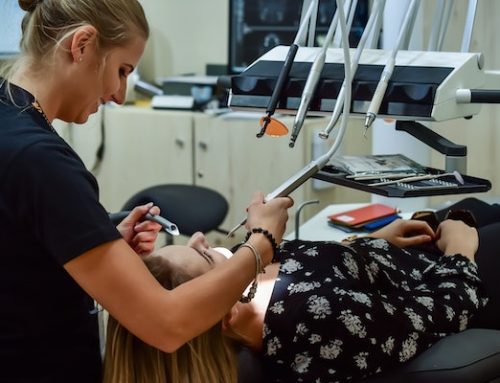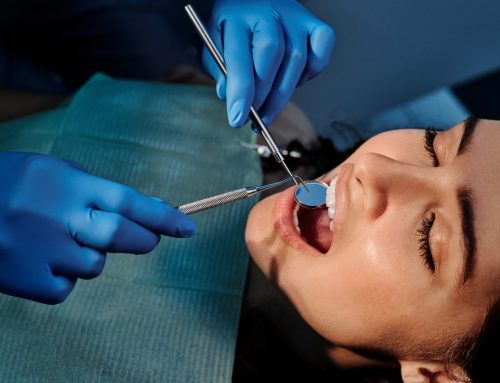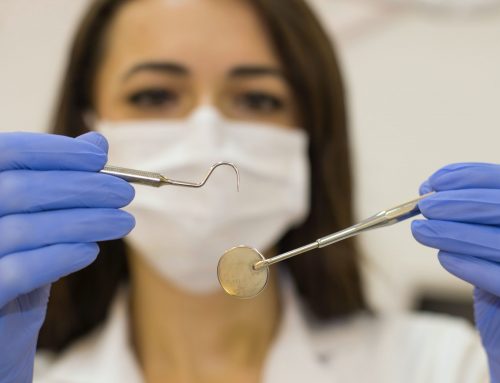When it comes to cosmetic dentistry, teeth whitening is one of the most sought-after treatments. Even if you’ve followed your dentist’s every instruction, your teeth may not be as white and vibrant as they once were. Teeth whitening has become a popular and affordable option to restore some of that sparkle, and the practice is growing more popular every year. By 2017, teeth whitening had become a $4.7 billion industry worldwide.
But what is teeth whitening, exactly? How does it work? Is it safe? Most importantly, is it right for you? Let’s take a closer look. Read on to learn what you need to know about teeth whitening.
What is teeth whitening?
Teeth whitening, sometimes known as teeth bleaching, is the process of lightening the natural colour of your teeth. Whitening removes stains without removing any of the tooth enamel. There are several ways to whiten your teeth. In-practice procedures, performed by your dentist, are the most effective, but take-home whitening options can be less pricey and easier to conform to your schedule. But, before you make the decision to pursue teeth whitening, you should know what kind of teeth discolouration you’re trying to remedy.
What is causing my teeth discolouration?
There are basically two kinds of tooth discolouration: intrinsic and extrinsic discolouration. Extrinsic discolouration are stains on the enamel, or outer layer, of your teeth. These stains come from the usual suspects:
• Acidic foods, such as citrus or sweets
• Drinks, particularly wine, coffee, and soda
• Tobacco use
• Poor dental hygiene
Intrinsic discolouration, however, can be more difficult to correct. These aren’t necessarily stains. Intrinsic discolouration can stem from larger, more natural causes, such as:
• Age: Dentin, the inner part of your tooth, darkens as you age. As your dentin darkens and your enamel thins due to general wear, your teeth will begin to appear darker.
• Trauma: Trauma can cause internal bleeding within your tooth, staining the dentin and producing a darkened colour.
• Medication: Overexposure to fluoride or certain antibiotics as a child, even before birth, can occasionally produce discoloured teeth.
• Genetics: Not everyone’s teeth are naturally as white as can be. Some of the discolouration in your teeth may simply the result of your genetics.
In-practice vs take home whitening
The truth is, not all stains can be corrected with teeth whitening, and some stains will be more easily removed than others. You’ll want to consider how thorough you want your whitening procedure to be, how much you’re willing to spend, and how much time you’ll want to allow for it. There are many options for teeth whitening today, but they can be separated into two categories: in-practice and take-home procedures.
At a dental practice, teeth whitening typically lasts one to two hours. Your dentist applies a protective solution to the lips and gums and a whitening gel to the teeth. This gel contains hydrogen-peroxide, which is activated by an LED light used by your dentist during the process.
Take-home products can be purchased from your dentist or over the counter. These are less expensive options and can be easier to fit into your busy schedule. While they will be less potent than the professional-grade equipment your dentist has at their disposal, take-home teeth whitening products can also be very effective. Take home teeth whitening options can include:
• Whitening toothpastes and mouthwashes
• Whitening strips and gels
• Bleaching Trays
Will teeth whitening damage my teeth?
Teeth whitening does no damage when applied appropriately to healthy teeth, though it can be overdone. Follow instructions directly. Applying more than the recommended amount of whitening gels or bleach can cause lasting damage. Also, don’t undergo whitening if you have other dental issues, such as cavities or gum disease, as this can result in pain and complications.
It is common for your teeth to be sensitive to cold for a few days after a whitening, and you may experience tender gums or a sore throat, but these usually pass. Also note that caps, veneers, and crowns cannot be whitened.
Do I need teeth whitening?
If you wish to restore some radiance to your smile, teeth whitening is a safe and practical solution to a common problem. Ask your dentist if a whitening procedure will be effective for you. Some extrinsic stains can be erased with a simple teeth cleaning at your next check-up, while some intrinsic stains can only be removed with an intrinsic, in-practice whitening.
Whitened teeth often undergo a bit of regression after a procedure, as the initial glow from the whitening fades. This is normal. If you want particularly white teeth, it can be wise to go a little whiter than your goal and let them fade into your desired colour.
The best thing you can do for yourself now is to avoid unhealthy dental practices that could lead to future discolouration, particularly tobacco and sweets. Drinking water regularly, especially after meals, is also an effective way to reduce staining. Taking good care of your teeth will not only preserve your fresh whitening, but it can also improve the results of your whitening in the first place, as healthy teeth tend to respond better to the procedure.
You’ll be glad you did it right
Consulting with your dentist is ultimately the best way to determine if teeth whitening is right for you. Contact the team here at Chapel Park Dental by giving us a call, or sending us an online query.




